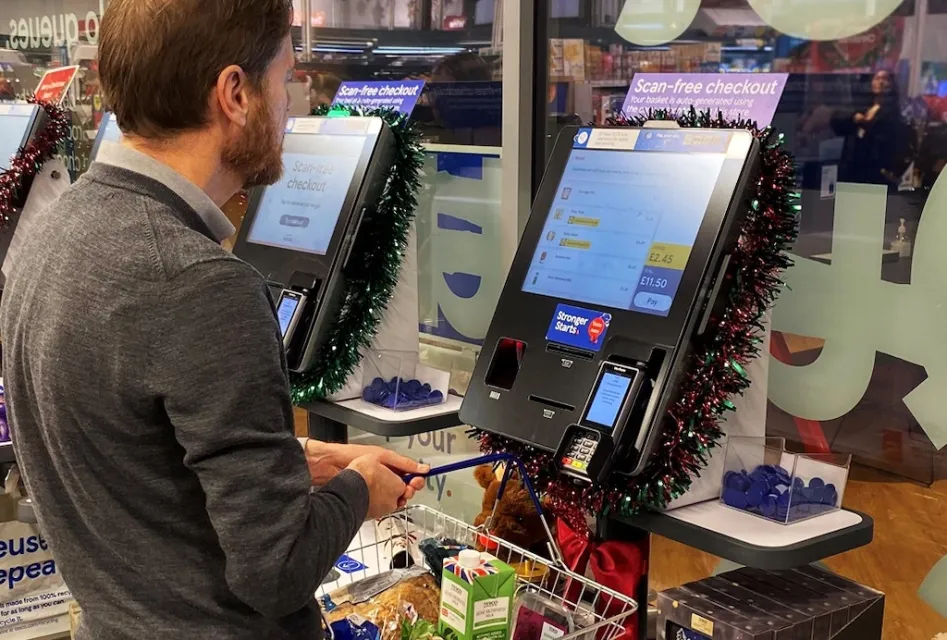By Riad Beladi
The United Kingdom is fast becoming a world leader in retail technology, combining innovation, adaptability, and a clear understanding of changing consumer habits. From artificial intelligence to automated warehouses, and from electronic shelf labels to self-service systems, British retailers are transforming how people shop. Over the next five years, retail in the UK is expected to become even more digital, more connected, and more responsive to consumer needs.
A Market in Motion
The British retail industry has always been competitive, but the new battleground is technology. Retailers are no longer just competing on price; they’re competing on experience, speed, and efficiency. Shoppers today expect more convenience than ever—faster checkouts, personalised offers, and real-time information about products and promotions.
To meet these expectations, retailers across the UK are turning to smart technologies. Artificial intelligence is being used to analyse customer behaviour and predict demand. Automation is improving stock management and delivery efficiency. Digitalisation—such as electronic shelf labels and self-scanning trolleys—is making shopping smoother and more interactive. This transformation is not just about cost-cutting; it’s about creating smarter stores and better experiences for customers.
Tesco and the Digital Shift
Tesco has long been the benchmark for British retail, and its technological journey shows why. The retailer has made digital transformation central to its strategy, using AI and data to shape everything from pricing to loyalty rewards. The Clubcard system, for example, now acts as a powerful data tool, creating tailored promotions that reflect individual shopping habits.
Inside its stores, Tesco continues to test automation, including computer vision systems that track stock levels and improve shelf availability. The chain’s “Scan-as-you-Shop” service and digital payment options make the shopping process faster and easier. Tesco’s approach reflects the wider trend in the UK retail market—technology serving people, not the other way around.
Innovation Across the Supermarket Aisle
Tesco may lead the way, but other British supermarkets are catching up fast. Asda is investing in electronic shelf labels (ESLs), allowing for instant price updates and accurate product information without manual label changes. Sainsbury’s has focused on predictive analytics to minimise waste and improve stock control, while Marks & Spencer and Waitrose are rolling out advanced in-store digital systems to monitor inventory and improve customer service.
Ocado, meanwhile, stands in a league of its own when it comes to fulfilment technology. Its robotic warehouses and automated picking systems are now being used by retailers worldwide, demonstrating that the UK is not just adopting technology—it’s exporting it.
Together, these initiatives show a clear pattern: British retail is moving from traditional operations to intelligent, tech-powered systems that respond directly to consumer behaviour.
The UK’s Global Position in Retail Technology
The UK has earned a strong reputation as one of the most forward-thinking markets for retail innovation. With its blend of tech-savvy consumers and competitive retail landscape, Britain provides the perfect environment for testing and scaling new retail technologies. Many global brands now see the UK as a launchpad for innovations that will later be rolled out internationally.
What sets the UK apart is collaboration. Retailers, tech start-ups, and universities often work together to develop real-world solutions—from AI-driven logistics systems to sustainable packaging designs. This ecosystem of innovation keeps Britain at the cutting edge of global retail.
Retail Technology Exhibition (RTE): The Hub of Innovation
At the centre of this technological movement stands the Retail Technology Exhibition (RTE), held annually in London. RTE has become the key meeting point for the industry—where retailers, suppliers, and technology providers come together to showcase new ideas and discuss the future of shopping.
RTE is not just another trade show; it’s a vision of what’s coming next. The event features everything from AI-powered checkout systems to next-generation electronic shelf labels, smart trolleys, and digital loyalty solutions. It’s where global innovation meets real-world retail challenges, offering British retailers a first look at the tools that will shape the next decade.
For many attending, RTE isn’t just about discovering products—it’s about building partnerships, finding inspiration, and keeping pace with rapid technological change.
What’s Next for UK Retail
The next five years will bring even more transformation. Several trends are already shaping the direction of British retail technology:
-
Artificial Intelligence Everywhere – AI will guide decision-making at every level, from supply chain management to personalised customer experiences.
-
Frictionless Shopping – Mobile payments, scan-free checkouts, and smart trolleys will make in-store shopping faster than ever.
-
Automation and Robotics – From fulfilment centres to shelf management, automation will continue to drive efficiency and reduce costs.
-
Sustainable Retailing – Technology will help retailers reduce waste, cut energy use, and improve traceability from farm to shelf.
-
Experience Over Price – As personalisation improves, the emotional connection between shopper and brand will become just as important as price.
Challenges to Overcome
Despite its progress, the retail industry still faces some hurdles. Integrating new technologies with older systems can be complex and expensive. Data protection and consumer privacy must remain a top priority. And while automation increases efficiency, it also raises questions about the future role of human workers in retail.
The challenge for UK retailers will be to strike the right balance—using technology to improve operations without losing the personal touch that keeps customers loyal.
Conclusion: A Human Future Powered by Technology
Retail in the UK is entering a defining decade—one shaped by artificial intelligence, automation, and digital innovation. Supermarkets such as Tesco, Asda, and Ocado are proving that technology can make retail smarter, faster, and more responsive without losing its human heart.
As exhibitions like RTE continue to inspire collaboration and innovation, the UK will remain a guiding light in global retail technology. In the end, it all comes back to one simple truth: no matter how advanced the systems become, retail will always follow the customer.
The question for the years ahead is clear—will shoppers still chase the best price, or will convenience and personal experience take the crown? Either way, the UK will be leading the experiment.


